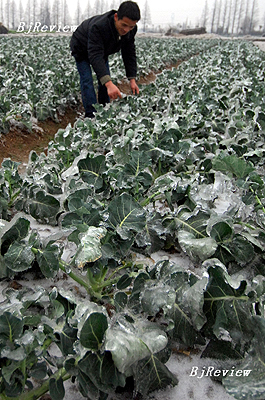|

Recent blizzards that swept across south China have left over 111 billion yuan ($15.5 billion) in direct economic losses. Farmers were hit the hardest as heavy snows destroyed their only source of livelihood.
"The damage was very rare," said Wu Dingfu, Chairman of China Insurance Regulatory Commission (CIRC).
Minister of Civil Affairs Li Xueju said on February 13 that over 12 million hectares of farmland had been affected seriously and more than 17 million hectares of forest were damaged by the unexpected snows.
"I lost more than 250,000 yuan ($35,000) because of the snows, and the vegetables on 2 hectares of land were totally damaged," said Fan Jianliang, a farmer in Chongfu Town, Zhejiang Province. Fan had a total of 20 hectares of vegetables. Despite his immediate and full effort in rescuing the vegetables, many were lost to the freeze or decayed due to the cold weather. Fan said that after the disastrous weather period he was only able to transport 2,000 kg of vegetables, one third of his normal capacity.
Under the help of the local government, Fan has started to resume production. But the losses because of the snowfall remain a headache. "I knew from the newspaper that cars damaged by the snow could be compensated by insurance companies. But there are few such insurance opportunities for us," complained Fan.
Insurance predicament
Currently, there are very few insurance products covering agriculture.
Statistics from CIRC showed that by February 12, insurers had paid over 1.04 billion yuan ($145 million) for the losses--nearly half of the coverage was for cars, and only 4 percent was for agricultural products. But the losses for agriculture were cataclysmic.
Yuan Li, Assistant to the Chairman of CIRC, attributed the problem to two reasons. First, the Chinese people, especially farmers, are not aware they can insure their crops. Second, there are few agricultural insurance products, and the ones available cannot satisfy the needs of farmers.
Yuan said it was difficult to devise such an insurance product. Agricultural insurance must be targeted at certain agricultural sectors. But agricultural disasters always occur across extensive areas, making it hard for insurers to investigate each case of each family.
In the United States, agricultural insurance covers about 75 percent of all farmers and over 100 agricultural products can be covered by various kinds of agricultural insurance. The U.S. Government pays for over half of the premium.
The Chinese Government had strived to promote agricultural development, devising means such as implementing a minimum purchasing price, subsidizing farmers for buying seeds and fertilizers as well as abolishing the agricultural tax.
The heavy snows have caused the government and insurers to rethink how they can create more insurance products for agriculture to guarantee the farmers in times of emergency. Such a system has not yet developed in China, but CIRC Chairman Wu urged insurers to set up a disaster insurance fund and claimed that the CIRC has started researching into this subject.
One way out
Though there are few insurance products covering vegetables, some other agricultural insurance did take effect this year.
A good example is the insurance for stock sows in Gansu Province. The blue-ear disease disaster and shortage of pigs last year forced the Gansu local government to come up with a scheme for insuring stock sows. The premium for each stock sow was 60 yuan ($8.4), and farmers only had to pay one fifth of the premium, with the rest being paid by the central and local governments. If a sow died from disease or other natural disaster, farmers can get 1,000 yuan ($140) in compensation. About 1,200 sows died because of the bad weather this year, and relevant raisers in Gansu were all compensated by insurance companies.
The insurance greatly reduced the losses farmers might have suffered and raised considerable awareness of the importance of insurance among farmers in that province.
Insiders suggested that government support might be the best solution for enforcing agriculture-related insurance.
Liu Yonghong, an official with the CIRC's Gansu bureau, said the increasing expansion of agriculture in China required more agricultural infrastructure and investment, while risks might follow. "The government must be involved," Liu said.
Liu said the government could be involved in two ways: subsidizing the farmers and supporting the insurers. At present, the income for a majority of farmers is very low, and they could not or were not willing to pay the premium for insurance, hence the government must join in and subsidize the farmers. On the other hand, China is a country vulnerable to natural disasters. Its agricultural industry is very fragile, which means that the loss ratio could be very high. In cases of extremes, insurance companies might not be able to sustain the astronomical compensation. Therefore, the government should subsidize the insurance companies to keep them going.
Insurance insiders also suggested the government set up agricultural insurance companies and provide favorable policies for them. | 